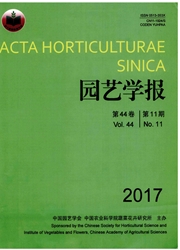

 中文摘要:
中文摘要:
利用子房注射法将甜瓜反义酸性转化酶基因导入厚皮甜瓜自交系‘01-3’果实,应用PCR和Southern Blot对后代进行分子鉴定。结果表明,330株甜瓜转化植株中,有2株为阳性转基因植株,转化率约为0.6%。进一步研究发现,T0代转基因甜瓜植株生长势减弱,果实比对照小30%左右,但可溶性糖含量比对照提高了52%。PCR和PCR-Southern Blot鉴定表明,T0-1的自交后代没有基因丢失,反义酸性转化酶基因已在转基因植株中稳定遗传。T1代转基因植株生长势也明显减弱,但成熟果实可溶性总糖含量提高了26%,蔗糖含量比对照提高了2.5倍,果糖和葡萄糖含量略有降低,酸性转化酶活性比对照明显降低。这些结果表明,反义酸性转化酶基因通过降低酸性转化酶活性,调控了甜瓜果实蔗糖代谢过程,改变了甜瓜果实糖分组成,同时抑制了植株生长。
 英文摘要:
英文摘要:
Anti-MAI1 gene was translated into melon fruits by ovary injection. PCR amplification and Southern Blot analysis showed that two transgenic plants were obtained from 330 melon plants, transformation frequency was about 0.6%, and each transgenic plant had double copies of anti-MAI1 gene. The To generation transgenic melon plants had lower growth ability, and the fruits were 30% smaller than control fruits, but had 52% more soluble sugar than control fruits. There was no gene lost in T0-1 progeny with the analysis of PCR and PCR -Southern blot. Also, transgenic plants of T1 generation had weaker growth ability than control plants. Each T1 generation transgenic fruit had higher soluble sugar and sucrose concentrations but had lower levels of acid invertase in ripe fruit than control fruits. These results suggest that acid invertase control sugar composition in melon fruit and this change in composition contributes to alterations in fruit size and plants growth ability.
 同期刊论文项目
同期刊论文项目
 同项目期刊论文
同项目期刊论文
 期刊信息
期刊信息
